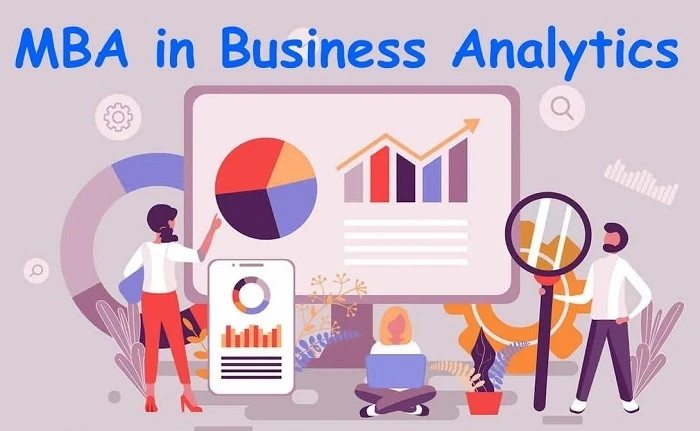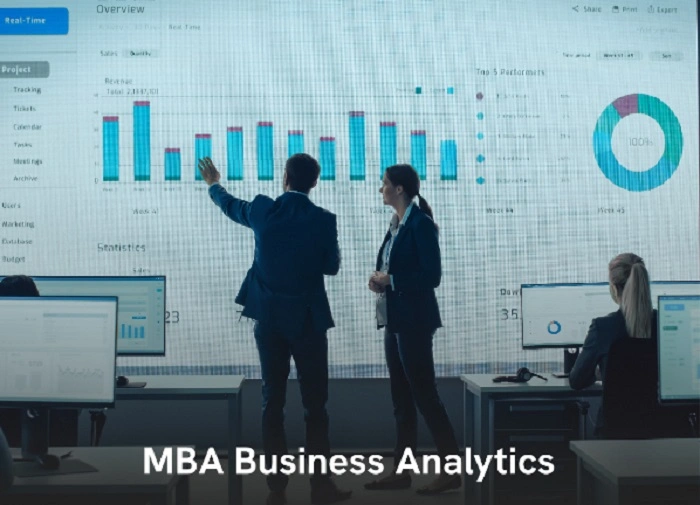The Master of Business Administration (MBA) has long been a gateway to leadership roles across industries, and with the digital age transforming the business landscape, there’s a growing emphasis on data-driven decision-making. The MBA in Business Analytics is an ideal blend of business acumen and technical know-how, equipping students with both strategic management skills and the ability to leverage data for high-impact insights. In this article, we’ll explore everything you need to know about pursuing an MBA in Business Analytics, from program structures and career benefits to key skills and future opportunities.
Why Pursue an MBA in Business Analytics?
In today’s world, businesses generate vast amounts of data. However, without skilled professionals who can interpret and act on this information, data is just numbers on a screen. Companies increasingly look to leaders who understand both business strategy and analytics, giving rise to the popularity of MBA programs with a specialization in Business Analytics.
Data is the New Currency
The phrase “data is the new currency” has become a reality in nearly every industry. From finance to retail and healthcare to entertainment, organizations rely on data for insights on everything from customer behavior to operational efficiencies. An MBA in Business Analytics prepares students to harness this information for informed decision-making.
A Bridge Between Business and Technology
An MBA in Business Analytics allows graduates to bridge the gap between traditional business roles and technology. As companies work to digitize processes and extract insights from vast data sets, they need professionals who can speak both the language of business and the technical language of data science.
What Will You Learn in an MBA in Business Analytics?
An MBA in Business Analytics combines core business principles with advanced analytics techniques. Courses are often designed to provide a well-rounded education in both management and data science.
Core Business Fundamentals
Like all MBA programs, students will study essential business disciplines such as:
- Management and Leadership: Courses often focus on leadership strategies, team dynamics, and organizational behavior.
- Finance and Accounting: Foundational knowledge in financial analysis, corporate finance, and budgeting is key for making informed business decisions.
- Marketing and Operations: Understanding market trends and managing efficient operations is crucial for any modern business.
Also Read: The Best Mood Off Shayari Emotional Shayari | Piyari Shayari
Specialized Analytics Training
The specialization in Business Analytics includes courses tailored to understanding and working with data. Some key areas often covered include:
- Data Mining and Big Data: Techniques for exploring and analyzing large datasets, uncovering hidden patterns and correlations.
- Predictive Modeling: Using historical data to predict future outcomes, helping businesses anticipate trends and prepare accordingly.
- Machine Learning and Artificial Intelligence: Leveraging algorithms to automate decision-making and enhance data processing.
- Data Visualization and Storytelling: Presenting data in a visually compelling way to ensure insights are actionable.
The Skillset: What You’ll Gain from an MBA in Business Analytics
An MBA in Business Analytics equips students with an impressive toolkit of hard and soft skills, critical for excelling in today’s data-centric business world.
Analytical Skills
Proficiency in data analysis is at the core of an MBA in Business Analytics. You’ll develop the skills to handle large datasets, conduct statistical analyses, and apply machine learning techniques to derive insights.
Technical Proficiency in Data Tools
Programs generally offer hands-on training with popular data analysis and visualization tools, such as:
- R and Python: Programming languages commonly used in data analysis.
- SQL: Essential for managing and querying databases.
- Tableau and Power BI: Visualization tools for presenting data findings in clear, interactive formats.
Strategic Thinking
Data-driven decision-making isn’t just about numbers; it’s about context. This MBA specialization focuses on integrating analytics within broader business strategy, training students to consider how data insights can influence company direction.
Communication Skills
Data doesn’t speak for itself. One of the key skills emphasized in this MBA is the ability to communicate findings effectively. Graduates are trained to translate complex data analysis into compelling stories that are accessible to both technical and non-technical stakeholders.
Career Opportunities for MBA in Business Analytics Graduates
The demand for MBA graduates with expertise in business analytics is rapidly rising, opening doors across various industries. Let’s explore some of the career paths available to graduates.
Business Intelligence Analyst
Business intelligence (BI) analysts are responsible for gathering, organizing, and analyzing data to support business decision-making. They often work with departments across the organization, identifying data trends and creating reports for management.
Data Scientist
With a strong focus on statistical modeling and machine learning, data scientists play a pivotal role in helping companies understand and leverage data. While a Ph.D. is often associated with data science, an MBA in Business Analytics can serve as a bridge to this field, especially for those interested in applying data science techniques within a business context.
Product Manager
Product managers with expertise in analytics are highly sought after in tech-driven industries. This role focuses on using data to inform product development, customer insights, and market trends.
Management Consultant
Consultants with a background in business analytics have an advantage in diagnosing and solving complex business issues. Management consulting firms increasingly look for professionals who can bring data-driven insights into their strategy recommendations.
Choosing the Right MBA in Business Analytics Program
Selecting the right program can be a crucial step in setting the foundation for your career. Here are some factors to consider:
Program Reputation and Accreditation
Look for programs with strong reputations and accreditations. Schools accredited by organizations like the AACSB, AMBA, or EQUIS often offer higher-quality programs that are well-regarded in the job market.
Curriculum Focus and Flexibility
The curriculum can vary between programs. Some focus more on the technical aspects, while others offer a more balanced approach. Ensure the program aligns with your career goals and interests.
Internship and Networking Opportunities
Programs with strong industry partnerships can provide valuable opportunities for internships, real-world projects, and networking with professionals already established in the field.
Challenges and Considerations
As with any degree, there are challenges to pursuing an MBA in Business Analytics. Understanding these can help set realistic expectations and prepare for the journey ahead.
Time and Financial Commitment
An MBA, especially with a specialization, requires a significant investment of both time and money. Consider program costs, potential financial aid, and whether a full-time, part-time, or online format is best for you.
Technical Demands
An MBA in Business Analytics often requires students to learn programming languages and statistical analysis, which can be challenging for those without a technical background.
The Future of Business Analytics and Data-Driven Leadership
As technology continues to evolve, the role of data in business will only become more significant. Emerging trends like artificial intelligence, machine learning, and IoT (Internet of Things) are opening new avenues for analytics and providing fresh insights for strategic decision-making.
The Growing Importance of Ethical Data Use
With more data at their disposal, companies face increasing scrutiny over how they use it. Ethical considerations in data privacy and bias are becoming key factors in business analytics. Graduates who understand these concerns can contribute positively to a company’s reputation and risk management.
The Rise of Automation and AI
Artificial intelligence and machine learning are reshaping industries, and professionals with skills in these areas are in high demand. An MBA in Business Analytics provides a foundation in these technologies, preparing graduates to leverage AI for data-driven solutions.
Is an MBA in Business Analytics Right for You?
An MBA in Business Analytics is a powerful choice for those who want to lead in a data-driven world. With a mix of business savvy and technical skills, graduates are well-prepared to address the complex challenges of modern industries.
If you’re drawn to the idea of making strategic decisions grounded in data, and you enjoy a combination of analytical and business-oriented tasks, this program could be an excellent fit. An MBA in Business Analytics not only opens doors to exciting career paths but also equips you with the skills to shape the future of business in a digital world.




